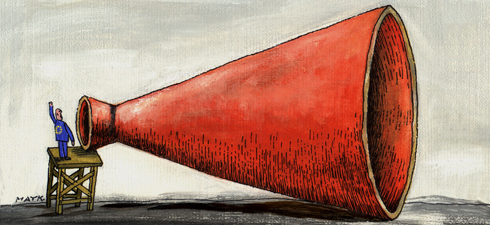José Manuel Barroso was not always the man at the head of a European Commission that can't get the financial crisis under control. In his youth, his native country of Portugal suffered under dictatorship. His political commitment is rooted in a genuine democratic conviction.
When he declared at the G20 summit in Los Cabos that Europe needs no lessons in democracy from anybody, and certainly not from countries that are not democracies at all, this was not an expression of a random bad mood. What was at stake for him was something he believes in deeply.
However, there are two problems with his argument. The first is that the European Union has a less democratic structure than he claims: between the populations and the EU administration yawns a certain gap. In part, this is due to the perverse habit of states and governments to blame everything that goes wrong in Europe on "Brussels".
But that's not all. Europe is the noble and heroic response of a political elite to the Second World War. As such, it is by far the most important political undertaking of our time. But gradually, it’s turning out that those origins are not sufficient grounds to justify the unification process over the long run.
Even before the eurocrisis grabbed all the attention, it was becoming ever harder to remain united, both on EU enlargement and on the deepening of European integration. But as long as the motor driving the Union was more prosperity, security and freedom, this was not so important. Which brings us to the second problem with Barroso’s outburst in Mexico.
Sleek Americans, dynamic Chinese
Even if one views Europe as a democracy, albeit a staged and therefore imperfect one, we cannot avoid the conclusion that its growth model looks extremely weary. Regions in which our Rhineland model does not exist certainly know greater social contradictions and injustices. They are less stable, and have greater shocks and swings between euphoria and depression.
At our best, however, we are a superior model of society that comes closest to the “greatest good for the greatest number”. But there are times in which other systems – the sleek Americans here, the dynamic Chinese there – prove to be economic and political competitors that sluggish old Europe no longer seems able to take on.
The two fundamental problems of Europe are mutually reinforcing. The discomfort of the citizens over the Union’s opaque groping towards decisions is growing more intense today, now that the decision-making process has proven incapable of saving the cornerstone of unification, the euro, from a downward spiral. The fear that the failure of the euro may prove a fatal wound to European integration may therefore be justified.
In his declaration Barroso, perhaps unconsciously, puts his finger on the actual wound: Can Europe be both more democratic and more efficient at the same time – that is, both politically and economically stronger? Or are these two goals mutually exclusive?
Was this article useful? If so we are delighted!
It is freely available because we believe that the right to free and independent information is essential for democracy. But this right is not guaranteed forever, and independence comes at a cost. We need your support in order to continue publishing independent, multilingual news for all Europeans.
Discover our subscription offers and their exclusive benefits and become a member of our community now!












